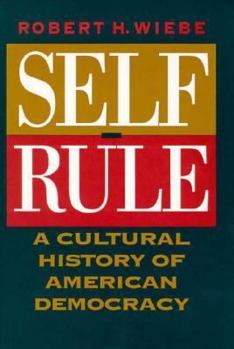Self-Rule: A Cultural History of American Democracy
Select Format
Select Condition 
Book Overview
Something profoundly important occurred in early 19th century America that came to be called democracy. Since then hundreds of millions of people worldwide have operated on the assumption that democracy exists. Yet definitions of democracy are surprisingly vague and remarkably few reckon with its history. In Self-Rule, Robert Wiebe suggests that only in appreciating that history can we recognize how breathtaking democracy's arrival was, how...
Format:Hardcover
Language:English
ISBN:0226895629
ISBN13:9780226895628
Release Date:March 1995
Publisher:University of Chicago Press
Length:332 Pages
Weight:1.00 lbs.
Dimensions:1.0" x 6.0" x 9.0"
Customer Reviews
2 ratings
A history of our democracy
Published by Thriftbooks.com User , 19 years ago
Robert Wiebe has written a brilliant history of the American meaning of democracy. Over the years, Wiebe had (he passed away a few years ago) read deeply in democratic theory whether written by philosophers, social scientists or what he calls publicists (what I would call popular commentators- people like Kevin Phillips, Robert Bellah, William Greider, Irving Kristol). He concluded that most of their writings about democracy had been skewed by a lack of any historical foundation. Their theories had no cultural specificity and no sense of what had worked as opposed to ideas about how democracy "should" work. This book is the result. He chose about 60 core writings (one by each author with the singular exception of Rawls who is allowed two). The introduction is a very enjoyable summing up of the some of the problems that Wiebe has with these core writings. It comes down to the fact that, whether from the left, right or middle, all of the authors feel that We the People have failed to live up to our responsibility to see it their way. (Please note that Wiebe is much more elegant about how he argues for his point). Wiebe then launches into his historical corrective. He has three major themes about the history of democracy in this country. The first theme is based on his assertion that, "societies organize around the rules of who works for whom, and the beneficiaries protect those rules in the name of all that is good in this world and holy in the next" (p.23). Wiebe asserts that there have been two major changes in those rules in our history and that those changes have created three major stages in our democratic history. The second theme is that our democracy has two major components: the collective and individual or, in another phrasing, popular self-government and individual self-determination (p.9). These components have sometimes worked with each other and sometimes against each other. The final theme is how the various institutions of democracy (e.g. voting qualifications) have been used to tame or obstruct some of the "excesses of democracy" Wiebe (I am stating this very baldly) sees the major changes as occurring sometime around the 1820s and the 1930s. In the first case, we moved from a system that was still based on deference to elites in all aspects of our lives. As a people we looked to leaders in our churches, in our local communities and on the national level to represent us, to act in our common interest. Many Americans arrived on these shores legally obligated to their employers. We were a nation of apprentices, indentured servents and tenants. Wiebe's democratic changes began with challenges to that form of work structure. Indentured servitude was challenged in the courts and lost. Apprenticeships began to disappear. After the War of 1812, the Native American no longer had any European power that helped them resist American incursion on their lands. We stole as much land from them as we could including large chunks of Alabama,
Contemporary Democracy in America
Published by Thriftbooks.com User , 20 years ago
Toqueville's Democracy in America brought up to date--i.e., post-Mexican War, Civil War, emancipation, Native Americans on reservations, urbanization, industrialization, Spanish War and consequent empire, national and corporate-global economy, incredible immigrations, world wars, New Deal, Cold War, Korean War, Civil Rights Movement, Women's Liberation, Reagan Revolution, Gulf War, etc.--up to the 1990's "seething discontents" and "selfish interests, oblivious to minority rights, passing unjust laws...all unchecked by an overriding vision of the public good or what it might consist of...." Decision-making and those left out of it, "a babel of narrow-minded parochial concerns." Beyond "the radical premise that something terrible had gone wrong in the world," a parade of brilliant insights and a self-help strategy. For instance, in the 20th century--unlike the USA before 1870, say--newcomers "needn't prove themselves anyone's equal"--they couldn't. They only needed "to find their proper level." And: Big national government focusing on the economy and military, leaving cultural and ethnic matters to local juries. Ruling opinion, i.e., "ideological habituation," having its effect, "as though instinctual."Wiebe was a small-d democrat, a disrespecter of those holding power, who risked--knowing the risk--believing in the potential to fulfill the dreams of democracy, liberty, and justice.Great book.




